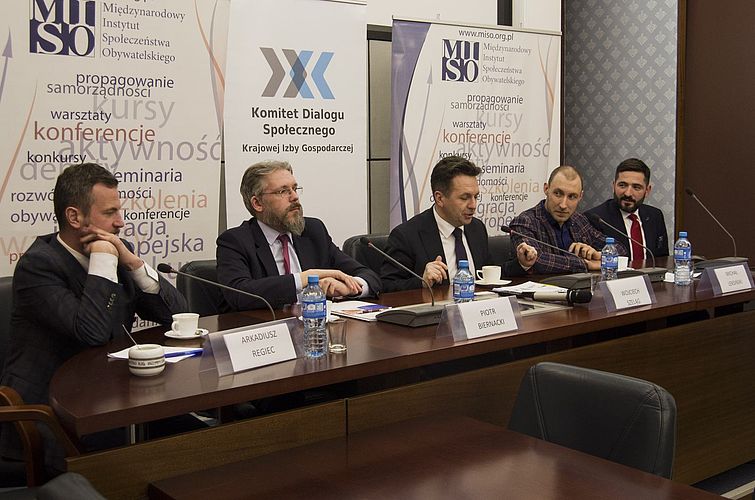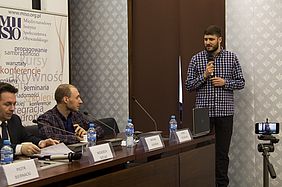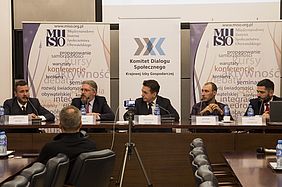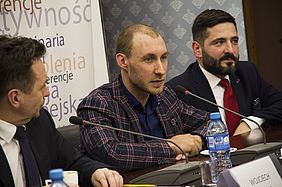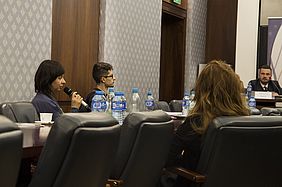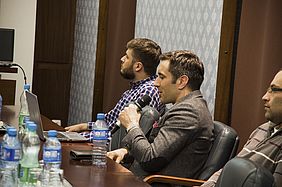The second debate of MISO’s Economics and Entrepreneurship Debate was Club was held on 22nd March 2018 at the National Chamber of Commerce in Warsaw – this time entitled “Crowdfunding – a financial pillar of the civil society?”.
Our guests for the event were: Piotr Biernacki (the Association of Stock Exchange Issuers – the SEG), Michał Leksiński (of Patronite.pl), Kamil Musielak (Centrum Analiz – MISO) and Arkadiusz Regiec (the president of Beesfund S.A and Polish Crowdfunding Society). The debate was moderated by Wojciech Szeląg (Polsat TV).
We started with discussing the very beginnings of crowdfunding (i.e. collecting money for the Statue of Liberty – where people would receive a 6-inch or 12-inch replica of the famous statue upon donating 1 or 5 dollars, respectively). This shows our tendency to financially participate in interesting projects. Today, thanks to social media and the tools involved, crowdfunding has become a lot easier and easily accessible to basically anyone who’s interested – Arkadiusz Regiec, the president of Beesfund said.
Unnecessary “regulosis”
We have many types of crowdfunding, but in Poland the most popular formats are rewards-based crowdfunding, subscription model (letting one subscribe to a creator/project and give them monthly payments), donation-based crowdfunding and equity crowdfunding – the latter becoming increasingly popular these days and some experts tend to believe it could become an important financing tool for Polish start-ups. However, there are certain regulatory doubts regarding this particular type of crowdfunding. And so, there are plans to introduce specific regulatory measures on the EU level that would give ESMA (European Securities and Markets Authority) competencies with regard to supervising equity crowdfunding platforms, but that could also block the future development of such platforms and eventually lead to complete loss of interest in this model of crowdfunding (all due to considerable penalties).Our guests, finding such regulatory interference rather unnecessary, refer to it as if it were an illness of sorts – hence the term “regulosis”.
Protection mechanisms
Kamil Musielak of Centrum Analiz at MISO believes that our daily life itself has shaped the standards of crowdfunding and no further regulatory measures are necessary. There are of course instances where people organise and promote fraudulent crowdfunding campaigns, but these are not very common and cause virtually instant social backlash (resulting in returning the collected sums to donors). Additionally, as far as charitable crowdfunding is concerned, contracts are entered into directly with hospitals and similar units (using the collected funds for particular therapies, procedures, etc.).
Crowdfunding as a test of one’s popularity
Seemingly, all types of crowdfunding are a big chance to easily collect large sums of money, also from the perspective of NGOs. But strong fanbase and real popularity are everything in this business, not just the brand or name. The problem is especially painful for NGOs which normally act as funding entities and not the ones needing the funds (we automatically associate certain entities with money, and we do not trust them when they start collecting it, irrespective of the purpose). Successful crowdfunding campaigns are based on strong emotions that we easily identify with as a society.
The debate was co-organized by MISO and Komitet Dialogu Społecznego of the National Chamber of Commerce, in cooperation with Orange Polska, acting as our partner.


